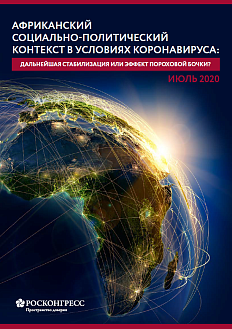In their research, PwC experts studied the impact of COVID-19 on business activity, including in the transport and logistics sector. In particular, the authors identified a number of areas in the transport and logistics sector that the COVID-19 outbreak affected the most, and prepared recommendations on what measures and in what areas should be included in the strategy for responding to the pandemic consequences in the transport and logistics sector.
Roscongress Foundation analysts highlighted the main theses of this research, accompanying each of them with suitable fragments of video broadcasts of panel discussions held as part of business programs of the key events hosted by the Foundation.
The coronavirus pandemic has led to serious disruptions in a number of areas in the transport and logistics sector. At the same time, the transport sector is essential for the economy and must function stably even during turmoil times.
Pandemics such as COVID-19 belong to the class of threats that are known in advance. As a rule, they spread more slowly than man-made disasters and natural disasters, but lead to longer-term consequences. The coronavirus outbreak has affected all elements of the value chain in companies and in the market. All were equally affected by the pandemic, which allows the authors to conclude that the current events can be attributed to the «black swan» phenomenon. Most contracts and agreements cease during these global shocks, but the provision of critical services such as the health and civil defense, transportation and logistics sectors must continue.
In the transportation and logistics sector, the COVID-19 outbreak has led to disruption and stress in a number of areas:
· destabilization and interruption of public transport (buses, subways, taxis, etc) operation;
· difficulties in daily work due to social distancing, remote work and absenteeism of employees, as well as due to a lack of supplies;
· the financial constraints of transport operators in their ability to operate critical transport networks and infrastructure;
· restrictions or delays in movement and delivery between countries;
· unforeseen destabilization of global supply chains undermines the ability of the transport sector to deliver essential medical supplies, food and essential goods;
· additional pressure on resources, as the transport sector must play an important role in ensuring social distancing, infection prevention, control, sanitization, etc.
Regardless of the scenario for further events development, during the entire period it is necessary to take anti-crisis measures to ensure activities continuity. How quickly business and business processes in the transport and logistics sector can be normalized will depend on the quality and speed of response measures, as well as relevant organizations’ actions coordination.
Managing ever-changing priorities and circumstances requires a flexible and proactive approach, including coordinated ecosystem-wide plan development to ensure coherent government support.
According to the authors, in the current conditions, representatives of transport and logistics companies should consider a possibility of applying a flexible approach in context of changing priorities due to national and international factors, as well as conduct scenario analysis in order to identify and prioritize risks, conduct early monitoring of the situation and continuous development of corrective activities.
The COVID-19 response strategy should include measures in six areas: customers and revenues, workforce, operations and supply chains, communications strategy, data openness and head office functions.
It is imperative to establish the central command post and equip it with necessary tools to organize coordinated and effective crisis management work. A proactive approach is needed to identify critical services to ensure business continuity and sustainability. The sustainability of organizations can be improved by recognizing, detecting, responding to, and recovering from future threats.
See other materials, placed in special sections of the Information and Analytical System Roskongress StayHomeEconomy, Transport, transit potential and value chain, dedicated to possible ways to stabilize the economy in a pandemic, as well as the development of the transport and logistics sector.






